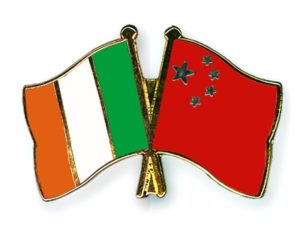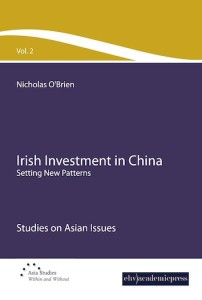 Fan Hong & J.C. Gottwald – The Irish Asia Strategy and Its China Relations 1999-2009 – 爱尔兰的亚洲战略与中爱关系 1999-2009
Fan Hong & J.C. Gottwald – The Irish Asia Strategy and Its China Relations 1999-2009 – 爱尔兰的亚洲战略与中爱关系 1999-2009
The Irish government’s Asia Strategy was initiated in 1999. It aimed to establish with Asian countries a coherent policy of engagement, on a political, economic, commercial, educational and cultural level. China was one of the countries identified as core in the Asia Strategy. Guided by the Asia Strategy political, economic, cultural, educational and social relations between Ireland and China have improved beyond recognition during the past ten years.
A decade after its inauguration the Asia Strategy is set to be revised to take account of the ever changing world. In this book for the first time, leading representatives from government, business and academia together revisit the Asia Strategy, examine its development and analyses it in the context of other European countries.
Following a Foreword by the Minister of Foreign Affairs, the authors discuss the political process that led up to the strategy and the roles of various actors within the strategy, in terms of Ireland-China in particular. Together with its Appendix containing an overview of significant historical steps in bilateral relations, this book presents an informative and in-depth analysis on Ireland’s Asia Strategy and its engagement with the emerging economies in the Asian region, especially China.
Fan Hong is Professor of Chinese Studies. She received her BA and MA in China and PhD at Strathclyde University in Glasgow. She was Chair in Chinese Studies at De Montfort University in UK before becoming the first director of the Irish Institute of Chinese Studies (UCC) since its funding in 2006 and first Head of School of Asian Studies since its founding in 2009. She has published extensively on Chinese historical and social issues.
J.C. Gottwald held positions at Free University Berlin and University of Trier before joining the UCC in 2006. He has published internationally on political and economic reform in China, European China policies and the politics of financial services regulation in Europe and China.
Contents
Acknowledgement (See Below)
Foreword – Micheál Martin, TD, Minister for Foreign Affairs
Foreword – Dr. Sha Hailin, Former Ambassador of the People’s Republic of China to Ireland
1. Introduction: The Rise of China and the Irish Asia Strategy – Fan Hong & Jörn-Carsten Gottwald
2a. China’s Economy and Enterprise ~ Part One – China’s Economy: Achievements, Challenges, And Future Orientation – Sha Hailin
2b. China’s Economy and Enterprise ~ Part Two – Business Competitiveness on which China’s Economic Strenght is based – Sha Hailin
2c. China’s Economy and Enterprise ~ Part Three – Sino-Ireland friendly cooperation and mutual development – Sha Hailin
3. Social Change and the Urbane –Rural Divide in China – Martin King Whyte
4. Towards a Creative China: Education in China – Geir Sigurdsson
5. Creating an Asia Strategy – Sean Gorman
6. Irish-Chinese Political and Economic Relations: An Overview – James Cuffe
7. Sino-Irish Relations: a View from China – John Armstrong & Yang Ning
8. Promoting Irish Interests: the Role of the Government – Michael Garvey
9. Friendship between Citizens: the Twinning of Cities – Pat Ledwidge
10. Connecting Cultures: the Role of Education – Fan Hong
11. Comparing Irish and Chinese Politics of Regulation – Jörn-Carsten Gottwald & Neil Collins
12. Ireland and the ASEM Process: the Case of the Asia Europe Foundation – Peter Ryan & Tom Hardiman
13. The Irish Strategy in European Comparison – Deirdre Coby, Niall Duggan & Benedikt Seemann
14. Ireland, China and the EU: Foreign Policy in a Europeanised Context – Andrew Cottey & Natasha Underhill
About the authors
Appendix I: A Decade of the Asia Strategy (1999-2009)
Appendix II: Speech by An Taoiseach Mr Bertie Ahern TD at Tsinghua University, Beijing, January 18, 2005
Appendix III: Chronology of Major Events of Sino-Irish Relations (1979-2009)
目录
前言 Micheál Martin, 爱尔兰外交部长
前言 沙海林博士, 前任中国驻爱尔兰大使
1. 绪论 凡红/ Jörn-Carsten Gottwald
2. 论中国经济 沙海林 – Sha Hailin
3. 中国的城市化进程与社会变迁 – Martin King Whyte
4. 创新中的中国教育 – Geir Sigurdsson
5. 爱尔兰亚洲战略的诞生 – Sean Gorman
6. 爱中政治与经济关系回顾 – James Cuffe
7. 从中国视角看中爱关系 – John Armstrong & Yang Ning
8. 为爱尔兰谋利益:爱尔兰政府的作用 – Michael Garvey
9. 架友谊之桥:科克-上海姊妹城市的诞生和发展 – Pat Ledwidge
10. 连接中西文化的纽带:教育与爱中关系 – 凡红
11. 爱中两国规章制度的政治解读 – Jörn-Carsten Gottwald & Neil Collins
12. 从亚欧基金会的发展看爱尔兰与亚欧峰会的关系 – Peter Ryan & Tom Hardiman
13. 独一无二的战略:以欧洲为背景的爱尔兰亚洲政策比较研究 – Deirdre Coby, Niall Duggan & Benedikt Seemann
14. 爱尔兰,中国与欧盟:欧洲的外交政策解析 – Andrew Cottey & Natasha Underhill
作者简介
附录 1 爱尔兰亚洲战略十年回顾
附录 2 爱尔兰总理于2005 年1 月18 日在清华大学的演讲
附录 3 爱中关系大事记
Acknowledgement
This is a long overdue book. It would never have been completed without the support of colleagues at University College Cork (UCC) in Ireland and the generous financial support from the Confucius Institute at UCC and Confucius Institute Headquarters in Beijing.
We would like to thank Professor David Cox, Head of the College of Arts, Celtic Studies and Social Sciences, and Professor Paul Giller, Registrar and Senior Vice President for Academic Affairs, at UCC, for their consistent support for the development of Chinese and Asian Studies; and Professor Gerry Wrixon, former President of UCC, and Michael O’Sullivan, former Vice President of UCC, for their generous support of the 2007 conference in which this book took shape.
We are grateful to Dr Michael Murphy, UCC President, and UCC’s senior management team for their vision, ambition and strong support to establish UCC as a centre of excellence for Chinese and Asian Studies in Ireland and Europe.
We wish to thank Anne Webster, member of the High Level Group for the Asia Strategy, Deirdre Gilane, Elizabeth McCullough, Amanda Bane and their colleagues from the Department of Foreign Affairs and the Department of Enterprise, Trade and Employment, Mary Lenihan from Cork City Partnership for their invaluable advice and support.
We have selected some photos which were taken by Yang Zengxiang, Philip Crosbie and Daragh McSweeney for the book. We are grateful for their support. Thanks also go to Philip for his assistance to select appropriate photos for this book.
We are particularly grateful to Professor Peter Herrmann and copy editors of Rozenberg Publishers for their invaluable professional assistance for publication.
Finally, our thanks go to the contributors of this book for their insight knowledge and patience; and colleagues in the School of Asian Studies, especially Lu Zhouxiang (Paul), David O’Brien and Shan Yuwu for their assistance in completing this book.
Fan Hong
Jörn-Carsten Gottwald





